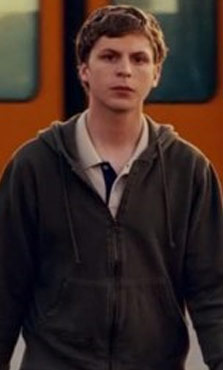
Like some rare tropical flower, the humor of adolescent boys—sarcastic, sex-crazed esoterica—is notoriously difficult to capture intact, but Greg Mottola’s wonderful “Superbad” does just that. Resembling in plot its more pedestrian cousins, “Superbad” soars with a flawless ear for dialogue—even better, for botched dialogue. Most teen comedies do the party scene or the disastrous make-out session with the usual panache, but not many depict awkwardness so brilliantly. Largely thanks to the expert deadpan delivery of Michael Cera as the mild-mannered Evan and the spastic dorkiness of Christopher Mintz-Plasse as McLovin (née Fogell), “Superbad” nails the whole spectrum of stammers, tics, coughs, flinches, paralytic pauses, and cotton-mouthed panic teenage boys suffer when placed in close proximity to the fair sex. Mottola allows the characters to fall on their faces (perhaps tripped up by mouthfuls of crass dialogue as wordy as Kevin Smith in full flight).
Cera is an incredible talent. Essentially playing an R-rated version of his TV role as George Michael Bluth on Arrested Development, Cera’s Evan is a decent, well-meaning, sharp-witted guy who hopelessly falls to pieces around girls. In their company, his face clouds over and settles into a frozen terror. He looks afraid of his own voice, and with good reason, as very often his voice seems completely disconnected from his brain. His trainwreck elocutions are more like automatic speeches, a weird, amiable form of Tourette’s syndrome.
But Evan never gives in to self-pity. Cera gives him a wan sort of confidence and self-assurance, as if he knows he’ll eventually find the right thing to say—maybe in seven or eight years, but one day for sure. Cera’s self-mangling turn here is every bit as nuanced and hilarious as John Cleese’s turn as Archie Leach, the middle-aged barrister in “A Fish Called Wanda”. He’s that good. He’s that British, at least in spirit. Maybe it’s his Canadian roots. Whatever the source, it’s marvelous to see this kind of deadpan humor in an American teen comedy.
Evan plays straight man to Seth (Jonah Hill), a fast-talking wiseguy who overflows with endlessly creative streams of foul-mouthed witticisms (nipples look like “little baby toes”) and obnoxious bluster (“by the time college rolls around I’ll be like the iron chef of pounding VAG!”). Like Evan, Seth seems cursed by his own brains. He’s a promising cartoonist who seems supernaturally bound, like some tragic hero of Greek myth, to obsess about sex. Cursed by a malevolent god: how else to describe an irresistible psychological compulsion to draw penises? Apparently a film buff with one thing on his mind, poor Seth draws phalluses of every size, shape, and posture in movie-poster roles as wonderfully varied as “Alien”, “Titanic” and “Dr. Strangelove”. Hill’s puffy, bug-eyed lothario is downright nasty at times, but this is to the film’s advantage, lacking as it does a true villain to persecute the trio of heroes. As these boys would be in real life, Seth and Evan are thwarted by their grasping horniness long before a pugnacious preppy shows up to plague them.
The film feels untampered with, raw enough to hazard the dirtiest of dirty jokes yet honest enough to portray its male leads as something more than bros in training. Amid the many uproarious jokes in “Superbad”, the best dialogue sounds unvarnished, as if taken from transcribed conversations. My favorite was the one Evan delivers in Seth’s bedroom, tossing a video game controller onto the bed: “What’s the...point of a game if you...you can’t even win?” No sparkle in that, and Cera mumbles it, but the line is winning for its artlessness. Seth’s weary surprise at finding himself stuck in another lifeless cul-de-sac of suburban boredom is the sort of thing adults tend to forget about.
It’s a tribute to Cera, Hill, and Mintz-Plasse that the laughs only dry up when Mottola cranks the hackneyed ‘zaniness’ up so loudly he forgets to stop and listen to his leads. The farcical sketches work, mostly—Evan’s run-ins with cars; the penis drawings; a skank getting her period; the entire police subplot involving McLovin; and the mock-soul brother Seventies soundtrack are all funny enough—but “Superbad” lives and breathes in the calmer flow when the actors are allowed to play their age in alternating currents of both brilliancy and dullness, the rhythms of lives waiting to start already.
“Superbad” began as a side project for its writers, Seth Rogen and Evan Goldberg, who started the script as thirteen-year-olds in Vancouver and continued writing it for over a decade. Perhaps their youth is the reason for the lack of sentimentality and nostalgia with which their alter egos are treated. Unlike Seth Rogen’s other major comedies, “The 40-Year Old Virgin” and “Knocked Up”, the goofy male camaraderie is written for exactly the right age group. The bonding sessions in the Apatow movies, embarrassing rugby scrums of emotionally retarded adult men collapsing onto each other in homoerotic relief, here resemble something sweet and apposite once transplanted back into the native soil of a teen flick.
Seth’s final break with Evan, occurring in a mall with Mottola skillfully shooting from Seth’s viewpoint as he is carried away from his best friend on an escalator, is a fine moment. The fact that Seth will probably go home and memorialize the moment by drawing penises in his notebooks makes their separation no less poignant. That “Superbad” can pull of this juxtaposition is a small and extremely funny miracle. |